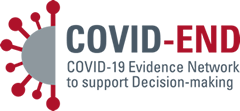Background to the living hub
Decision-makers may want to identify organizations that are supporting decision-making with a specific topic or sectoral focus, with a specific type of resource (e.g., recommendations, evidence syntheses or data), and/or with a specific geographic or linguistic scope.
COVID-END partners – the African Centre for Evidence and the McMaster Health Forum – have created a living hub of COVID-19 knowledge hubs to help identify such organizations.
COVID-19 knowledge hubs are broadly defined as any publicly available platform whose main aim is to collate and share relevant data, research and other types of evidence related to the COVID-19 pandemic.
Because the list of included hubs and the data available for each hub will be updated periodically, we refer to it as a ‘living’ hub of COVID-19 knowledge hubs.
The living hub of COVID-19 knowledge hubs can help people like these:
- a social-services policymaker in Ghana may use the living hub of hubs to rapidly identify organizations in Ghana (or in English-speaking west African countries more generally) that may have already prepared locally relevant resources that can help to guide her country’s COVID-19 response;
- a stakeholder in Argentina may use it to look for comparative analyses of COVID-19 data from Latin American countries that are explained in Spanish and can be used in a briefing he is giving to peer organizations; and
- a research group may use it to avoid duplication when setting up a new COVID-19 knowledge hub and to improve coordination among existing hubs.
The living hub of COVID-19 knowledge hubs was developed through a systematic process of identification, screening and coding of hubs that met pre-defined eligibility criteria. Of the 440 hubs that were originally identified, 304 hubs met our eligibility criteria.
For even richer detail, review the full dataset.
Search our guide to key
COVID-19 evidence sources
